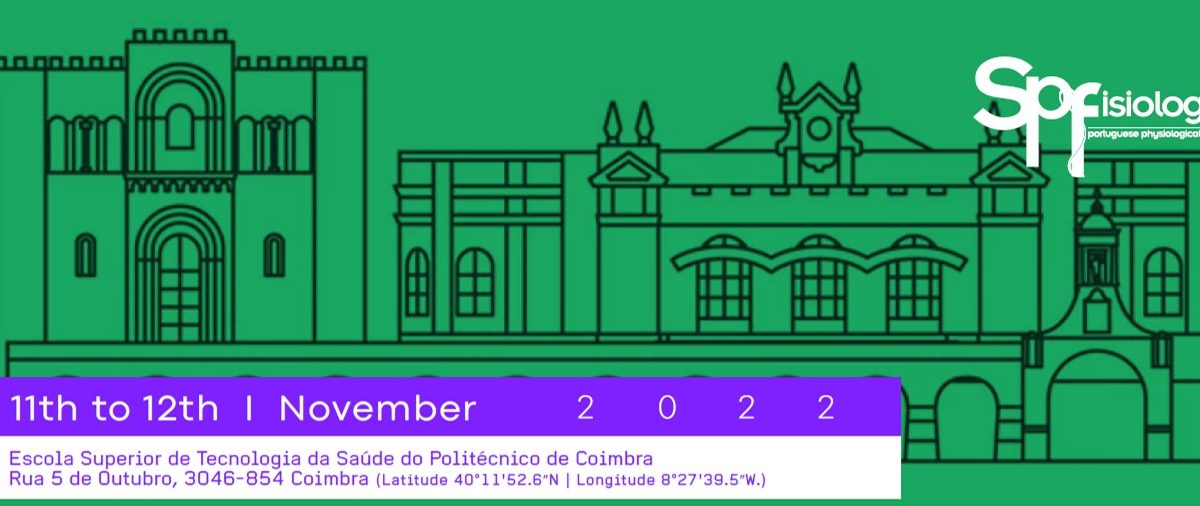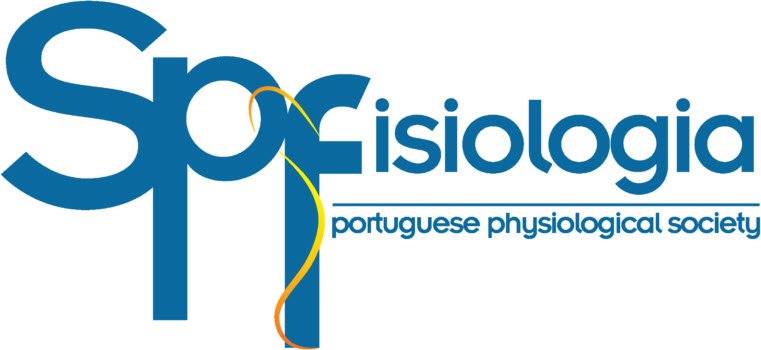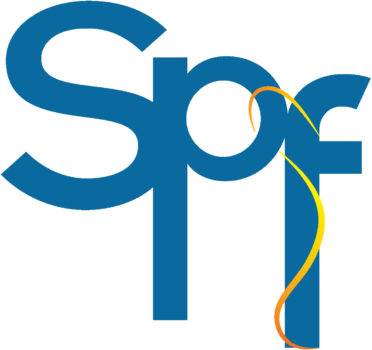2nd Internacional Meeting of Physiology - SPFis 2022
The 2nd International Meeting of the Portuguese Society of Physiology took place in Coimbra, Portugal, on the 11th and 12th of November 2022, at the Higher School of Health Technology of the Polytechnic of Coimbra.

Program
You can consult the detailed program flyer here [+]
Abstract book available in pdf here [+] (published in Frontiers – https://doi.org/10.3389/978-2-88971-027-0).
Friday – November 11th
Workshops
- Workshop 1 “Exploring biosignals using BITalino“ by PLUX
- Workshop 2 “new tools to explore hypoxia“ by TypeSolution
Opening session with the presence and interventions of:
- Presidente do Instituto Politécnico de Coimbra e Diretor da Escola Superior de Tecnologia da Saúde
- Ministro da Ciência, Tecnologia e Ensino Superior (representado)
- Susan Wray, Int Union Physiological Societies and Federation of European Physiological Societies (FEPS) Presidente
- Luis Monteiro Rodrigues, Presidente da SPFIS
Seminar I – Teaching Physiology
- Moderators: Vicente Martinez Perea -The Spanish Physiological Society and Carlos Nunes Filipe – Nova Medical School
- “Human Physiology in the Portuguese higher education system – a current view” L. Monteiro Rodrigues et al., CBiOS Lisboa, U.Lusofona
- ”Clinical Physiology in Portugal – a recent history” Telmo Pereira, ESTeSC, I.P.Coimbra
- “Novel pedagogical tools in the teaching of medical physiology – is new always better?” Diogo Santos Ferreira, Dep. Surgery and Surgery & UnIC@RISE, Fac. Medicine, U.Porto
- “Human vs. machine learning: enhancing student metacognition via the active learning of physiology” Jorge Ascenção Oliveira, Dep Pharmacology, Fac. Pharmacy-U.Porto
- “Implementation of physiology and pathophysiology teaching in a novel Portuguese undergraduate medical curriculum” André Leite-Moreira, U.Aveiro Dep Medical Sciences
- Round table and open discussion
Saturday – November 12th
Seminar II – Who What Where – Showroom of Physiological Research in Portugal
- Short presentations from representative national laboratories: BioISI FCUL; CBIOS ULusofona; CIAFEL | FADEUP ; CIDESD | UTAD; DCF FMUP; IBEB FCUL; ICBAS MedInUP; iCBR FMUC; IF CCUL FMUL; IF FMUC; NOVA FCMUNL; IT-IST UL; LABINSAUDE IPC
Wrap-up
- Moderator: Adelino Leite-Moreira, DCF Fac. Medicine U.Porto
SPF General Assembly
Election of the new board 2022-2025
Podium Session – Selected podium presentations
Moderators: Ana Sofia Fernandes, CBIOS ULusofona and Telmo Pereira, ESTeSC IPC
Neurophisiology
- CL (21493) – VPAC1 and VPAC2 receptors are opposingly altered in the Li2+-pilocarpine model of temporal lobe epilepsy. – Marta Bento et.al; 1 – Departamento de Química e Bioquímica, and 2-Biosystems & Integrative Sciences Institute (BioISI), Faculdade de Ciências da Universidade de Lisboa, Lisboa, Portugal.
- CL (21505) – β-adrenoceptor antagonists affect the establishment of traumatic memories and anxiety-like behaviour in a post-traumatic stress disorder mice model – Rafaela Seixas et.al; 1 – Department of Immuno-Physiology and Pharmacology, Laboratory of General Physiology, School of Medicine and Biomedical Sciences (ICBAS), University of Porto (UP); 2 – Center for Drug Discovery and Innovative Medicines, University of Porto (MedInUP); 3 – Department of Biomedicine, Faculty of Medicine, University of Porto (FMUP)
- CL (21507) – Contextual fear memory impairment in adrenaline-deficient mice may be related to downregulation of the M4 muscarinic receptor subtype in the hippocampus– Ana Oliveira et.al; 1 – Department of Immuno-Physiology and Pharmacology, Laboratory of General Physiology, School of Medicine and Biomedical Sciences (ICBAS), University of Porto (UP); 2 – Center for Drug Discovery and Innovative Medicines, University of Porto (MedInUP); 3 – Institute for Molecular and Cell Biology (IBMC), Institute for Research & Innovation in Health (I3S), University of Porto
Integrated – Metabolism
- CL (21433) – WWOX inhibition by Zfra1-31 ameliorates brain mitochondrial dysfunction and oxidative stress in a mouse model of type 2 diabetes– Cristina Carvalho et.al; 1 – Center for Neuroscience and Cell Biology (CNC), University of Coimbra, Portugal; 2 – Institute for Interdisciplinary Research (III), University of Coimbra; 3 – Center for Innovation in Biomedicine and Biotechnology (CIBB); 4 – PhD Program in Experimental Biology and Biomedicine (PDBEB), University of Coimbra, 3030-789 Coimbra, Portugal; 5 – Institute of Physiology, Faculty of Medicine, University of Coimbra, Coimbra, Portugal
- CL (21595) – Methylglyoxal and high fat diet negatively impact perivascular adipose tissue contributing to vascular dysfunction in rat models of metabolic syndrome – Adriana Malheiro et.al
1 – Institute of Physiology, iCBR, Faculty of Medicine, University of Coimbra, Portugal - CL (21495) – Physiology of body composition – how do vegetarians and omnivores differ? – Cíntia Ferreira-Pêgo et.al; 1 – CBIOS – Universidade Lusófona’s Research Center for Biosciences & Health Technologies
CL (21500) – Long-term management of metabolic diseases after bariatric surgery – Cláudia Amaro Dos Santos et.al; 1 – CBIOS
Integrated – Cardiovascular
- CL (21631) – Ketones impact on cardiac outcomes in a rat model of HFpEF – Alexandre Gonçalves et.al; 1 – Faculdade de Medicina da Universidade do Porto (FMUP); 2 – Instituto de Ciências Nucleares Aplicadas à Saúde; 3 – Instituto de Investigação Clínica e Biomédica de Coimbra (iCBR); 4 – University Hospital Würzburg
- CL (21437) – Therapeutic implications of urocortin-2 in Heart Failure with preserved Ejection Fraction – Inês Vasconcelos et.al; 1 – Faculty of Medicine University of Porto, UnIC-RISE, Department of Surgery and Physiology, Porto, Portugal; 2 – Faculty of Nutrition and Food Sciences, University of Porto, Porto, Portugal
- CL (21503) – Cardiac stretch-induced compliance is impaired in a rat model of heart failure with preserved ejection fraction – André Leite Moreira et.al; 1 – Faculdade de Medicina da Universidade do Porto; 2 – UnIC @ RISE; 3 – Centro Hospitalar Universitário São João
- CL (21644) – Muscle reoxygenation kinetics during six different variations of push-up exercise – Andreia Teixeira et.al; 1 – University of Trás-os-Montes e Alto Douro, Vila Real, Portugal; 2 – Department of Sports Science, Exercise and Health; 3 – Research Center in Sports Sciences, Health Sciences and Human Development (CIDESD), Vila Real, Portugal
- CL (21659) – SALUS – an IoT wearable device for the assessment of cardiovascular health- João Brito et.al; 1 – Instituto de Biofísica e Engenharia Biomédica, Faculdade de Ciências da Universidade de Lisboa; 2 – Unidade de Sincope, Cardiologia, Hospital de Santa Marta, Centro Hospitalar e Universitário de Lisboa Central; 3 – Medicina 2.4 Núcleo de Investigação Arterial, Centro Hospitalar e Universitário de Lisboa Central, NOVA Medical School
Discussion
Visit to exhibitors and posters
Awards and Distinctions
- Science Award , which is intended to distinguish innovation and societal impact in education and research in physiology. You may consult here [+] This award is sponsored by:

- Young Scientist Travel Award, which is intended to support the travel of the young scientist. You may consult here [+] This award is sponsored by:

Wrap-up and Closing Remarks.
Closing Champagne toast
Principal Donators and Sponsors
You may consult here [+] more details and photografic gallery.

